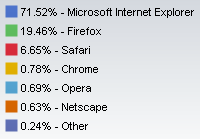The iconic "Tank Man" photo taken during the 1989 Tiananmen crackdown and banned in China was available on Google.cn Wednesday, hours after the online giant vowed to defy Chinese Internet censors.
 Photo shows a protester holding a poster of the "Tank Man" democracy activist stopping tanks in Beijing during the 1989 pro-democracy movement. The photo, banned in China, was available on Google.cn Wednesday, hours after the online giant vowed to defy Chinese Internet censors.
Photo shows a protester holding a poster of the "Tank Man" democracy activist stopping tanks in Beijing during the 1989 pro-democracy movement. The photo, banned in China, was available on Google.cn Wednesday, hours after the online giant vowed to defy Chinese Internet censors.Google announced Tuesday it would no longer censor search engine results in China and possibly pull out of the world's largest online market, citing cyber spy attacks and Chinese Web censorship.
The picture of a Chinese man who boldly stood in front of a line of tanks during the 1989 crack down on pro-democracy protests made headlines around the world. It is banned in China where the event is still hugely sensitive.

A search for the image on Google.cn displayed the photo immediately, while the image did not come up on Baidu.com, another popular Chinese search engine.
Searches for other sensitive topics such as the Dalai Lama and the banned Falungong spiritual group were also returned on
Google, but were also available on some Chinese portals.
China blocks Web content it deems politically objectionable in a vast censorship system dubbed the "Great Firewall of China."
Google said it was targeted by China-based cyber spies along with at least 20 other unidentified firms in an apparent bid to hack into the email accounts of rights activists around the world.

Several people, some bearing flowers, turned up Wednesday at Google's China headquarters in Beijing to show their support for the Internet giant.
"We are ordinary Google users who have come here to say thank you. We want to show our support to Google," said one woman, who would not give her name.
Some Internet users expressed dismay at Google's possible pull-out.
In an online survey of over 14,000 people on 163.com, a popular portal, nearly 78 percent said they did not want to see Google leave the Chinese market.
"If Google leaves, then I will not go online," one person said on 163.com.
"Google, by defending its commercial morals, will only receive more of netizens' understanding and support," said an online user on sina.com, another Chinese portal.
Reaction in China's state-controlled media was muted.
China Central Television, the government's main television propaganda arm, made no mention of the story in its midday news broadcast.
Other major state-run outlets ran only brief reports that failed to mention the allegations of government Internet censorship or hacking directed at rights activists.

U.S. Secretary of State Hillary Clinton called on Beijing Tuesday to explain cyber attacks originating from China against Google and at least 20 other firms.
"We look to the Chinese government for an explanation," Clinton said in a statement after Google vowed to defy Chinese Internet censors in outrage at "highly sophisticated" cyber attacks aimed at Chinese human rights activists.





























